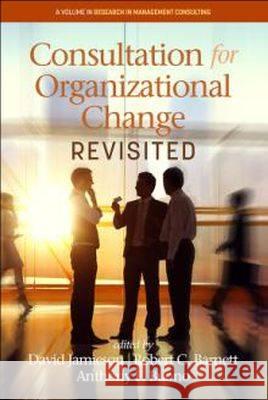Consultation for Organizational Change Revisited (HC) » książka
Consultation for Organizational Change Revisited (HC)
ISBN-13: 9781681234328 / Angielski / Twarda / 2016 / 330 str.
Consultation for Organizational Change Revisited (HC)
ISBN-13: 9781681234328 / Angielski / Twarda / 2016 / 330 str.
(netto: 392,80 VAT: 5%)
Najniższa cena z 30 dni: 406,56
ok. 30 dni roboczych.
Darmowa dostawa!
A volume in Research in Management Consulting: Series Editor: Anthony F. Buono, Bentley University and Contemporary Trends in Organization Development and Change: Series Editors: Peter F. Sorensen, Benedictine University and Therese F. Yaeger, Benedictine University As a follow-up to a 2010 volume on organizational change-related consulting, the book continues to push our thinking about the dynamics involved in consulting with change leaders and intervening in the change process. Consulting for organizational change is a special type of consultation, with its own complex set of conditions and needs for a broad range of skills and competencies, which include distinct needs for the client-consultant relationship, superior consulting/facilitation skills, an expertise in human and organizational systems, and, as emphasized in the volume, the masterful "use of self." As with our prior edited collection, this volume is a joint publication in the Research in Management Consulting and Contemporary Trends in Organization Development and Change book series. The dual focus is intended to reflect the importance of quality consulting for change across both the management consulting and Organization Development (OD) fields. It follows a long history of interest in how consulting affects organization change, what works, and, perhaps most importantly for generating theory and insight into the change process, why it works. The book contains fourteen chapters that frame the changing nature of the organizational change challenge, explore the use of self in intervening in organizations, and examine different change frameworks and perspectives, sharing various reflections and personal insights into the underlying challenges of consulting to bring about organizational change. Our underlying goal is to advance the theory and practice of effective organizational change consultation, stimulating thinking and discussion among change practitioners and researchers so that this work and profession continue to grow and evolve.
A volume in Research in Management Consulting: Series Editor: Anthony F. Buono, Bentley University and Contemporary Trends in Organization Development and Change: Series Editors: Peter F. Sorensen, Benedictine University and Therese F. Yaeger, Benedictine UniversityAs a follow-up to a 2010 volume on organizational change-related consulting, the book continues to push our thinking about the dynamics involved in consulting with change leaders and intervening in the change process. Consulting for organizational change is a special type of consultation, with its own complex set of conditions and needs for a broad range of skills and competencies, which include distinct needs for the client-consultant relationship, superior consulting/facilitation skills, an expertise in human and organizational systems, and, as emphasized in the volume, the masterful "use of self." As with our prior edited collection, this volume is a joint publication in the Research in Management Consulting and Contemporary Trends in Organization Development and Change book series. The dual focus is intended to reflect the importance of quality consulting for change across both the management consulting and Organization Development (OD) fields. It follows a long history of interest in how consulting affects organization change, what works, and, perhaps most importantly for generating theory and insight into the change process, why it works.The book contains fourteen chapters that frame the changing nature of the organizational change challenge, explore the use of self in intervening in organizations, and examine different change frameworks and perspectives, sharing various reflections and personal insights into the underlying challenges of consulting to bring about organizational change. Our underlying goal is to advance the theory and practice of effective organizational change consultation, stimulating thinking and discussion among change practitioners and researchers so that this work and profession continue to grow and evolve.











